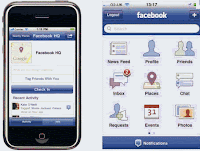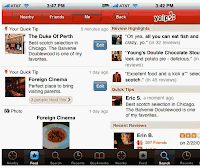 Since the unveiling of the newest Facebook application 'Places,' there has been a lot of speculation about its potential for helping users share reviews, meet new people, and find the best attractions in the area. So far, despite a few initial snags, Facebook insists that the roll-out of the application is off to a good start.
Since the unveiling of the newest Facebook application 'Places,' there has been a lot of speculation about its potential for helping users share reviews, meet new people, and find the best attractions in the area. So far, despite a few initial snags, Facebook insists that the roll-out of the application is off to a good start.Facebook Places is still primarily an iPhone app, although it can be accessed through the Facebook Touch Mobile site (you must have a browser that supports geolocation and HTML 5, however). It works much the same way its forerunner, Foursquare does: you can 'check in' to places, write about where you are, and tag people who are with you. The check-in updates that you opt to receive from other friends using the app are sorted by how far away the location is from you (closest to farthest). So far, although there is talk of expanding the app to overseas locations, it is still only available in the U.S., even though about 70% of users are overseas. It is also expected to be available for Androids and Blackberries in the future, though no specific date has been set.
Facebook and Google are expected to clash over the new application (Zuckerberg says they will 'compete a bit') since both are striving to be the largest provider of locations for everything from fine dining to dry cleaners.
Facebook Places is in fact a follow-up on Google Places, which is dedicated to helping people find out about individual organizations and businesses through customer reviews, and offers addresses and street views. Unfortunately, Google also has advertisements alongside the information it provides, whereas Facebook users often rely on each other to discover relevant products, and the vast majority of content generated by Facebook users (all 500 million of them) is invisible to Google search engines. Both Google Places and Facebook Places allow businesses to register for their own page and market to users, but it remains to be seen who will gain the upper hand.

 Other companies offer comparable game-like location applications: Foursquare, for example, allows everyone to broadcast their location, write reviews, and tag friends who are with them. Yelp, while not so much a “see where I am'' service, serves the function of providing a place for its users to "Find, review and talk about what's great - and not so great, in your area."
Other companies offer comparable game-like location applications: Foursquare, for example, allows everyone to broadcast their location, write reviews, and tag friends who are with them. Yelp, while not so much a “see where I am'' service, serves the function of providing a place for its users to "Find, review and talk about what's great - and not so great, in your area."Surprisingly, since Facebook Places was released, other applications, like Foursquare, are attracting more users. Even slightly smaller applications like My Town and earlier examples of the Places tool such as Twitter Places, are jumping on the train, as the appeal of tracking and reviewing locations continues to grow.
 All of these applications will have a growing impact on businesses, both big and small. Facebook in particular will provide businesses with a valuable opportunity: each place can claim their own page and use it to market to people using the Places application. As people check in, they are already advertising the business to all of their other friends, and online data can be collected, to see how many people are reading about them, and how often. As businesses learn more about the Places applications, they will be able to utilize the publicity more effectively, and control their content more closely, which in turn could greatly improve their profitability.
All of these applications will have a growing impact on businesses, both big and small. Facebook in particular will provide businesses with a valuable opportunity: each place can claim their own page and use it to market to people using the Places application. As people check in, they are already advertising the business to all of their other friends, and online data can be collected, to see how many people are reading about them, and how often. As businesses learn more about the Places applications, they will be able to utilize the publicity more effectively, and control their content more closely, which in turn could greatly improve their profitability.

No comments:
Post a Comment